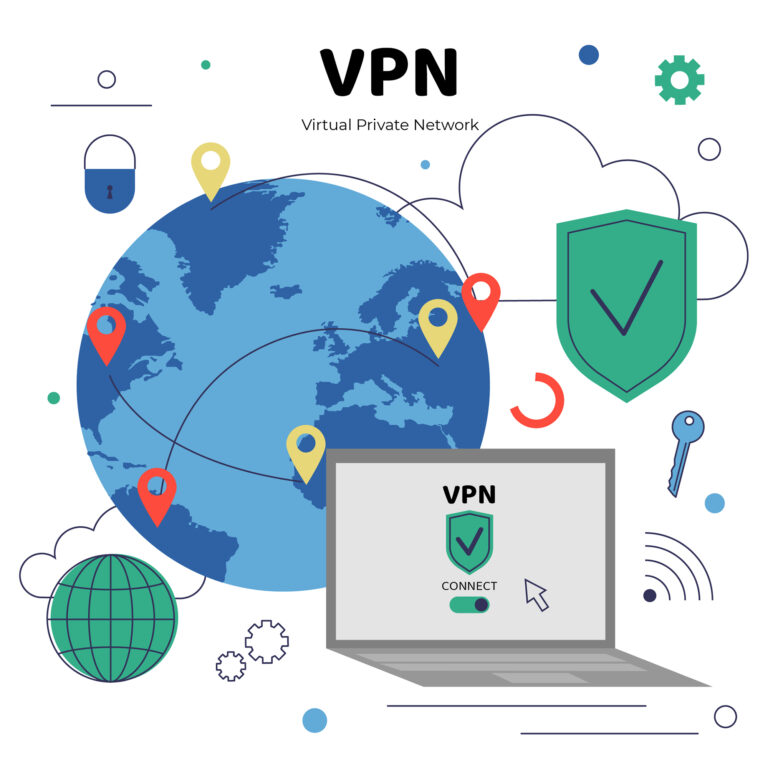Cybersecurity and VPNs: How Virtual
Private Networks Protect Your Data
Online

In today’s digital world, keeping your information safe online
is more important than ever. One tool that can help is a
Virtual Private Network, or VPN. Let’s explore how VPNs work
and why they’re useful for online security.
What is a VPN?
A VPN is like a secret tunnel for your internet connection. When you use a VPN, it hides your
online activity from prying eyes. Think of it as putting your internet data in an envelope before
sending it out.
How does a VPN work?
When you connect to the internet through a VPN:
1.It scrambles your data so others can’t read it easily.
2.It hides your real location by making it look like you’re somewhere else.
3.It masks your identity by replacing your IP address (your device’s online ID) with a
different one.
Why use a VPN?
VPNs help protect you in several ways:
1.Privacy: Your internet service provider, websites, and hackers can’t see what you’re
doing online.
2.Security: When using public Wi-Fi (like at coffee shops), a VPN keeps your data safe from
others on the same network.
3.Freedom: Some websites or services might be blocked in your country. A VPN can help
you access them by making it seem like you’re in a different place.
4.Anonymity: It’s harder for companies to track your online habits for advertising.
VPNs in the Workplace
Virtual Private Networks (VPNs) are particularly essential in the workplace, especially with the
rise of remote work. VPNs are a crucial tool for
businesses implementing work-from-home or remote setups. They allow employees to securely
access on-premises private networks as if they were physically connected, and they can connect
remote private networks into a wide area network (WAN).
VPNs also offer expanded visibility by enabling businesses to log, filter, and monitor traffic. This
visibility is critical for maintaining security, especially as remote work increases the number of
potential access points to a company’s network. However, it’s important to ensure that the
endpoint security VPN client is secure, as attackers can exploit any vulnerabilities to breach the
network.
Understanding VPN Vulnerabilities
While VPNs offer significant security benefits, they are not without vulnerabilities.
Endpoint security VPNs can be susceptible to network architecture issues,
authentication risks, and endpoint risks, particularly when employees use personal devices that
may not be adequately secured. To mitigate these risks, it’s essential to implement strong
authentication measures and utilize a reliable endpoint protection platform (EPP) that includes
features like next-generation antivirus (NGAV), intrusion prevention systems (IPS), and endpoint
detection and response (EDR).
By deploying VPNs through such platforms, businesses can enhance their security posture,
ensuring that data loss prevention (DLP), simplified management, and secure incident response
capabilities are all integrated into their cybersecurity strategy.
References
1. HOW TO USE ENDPOINT SECURITY VPN CLIENT? https://www.xcitium.com/edr-security/endpoint-security-vpn-client/
2. Choosing the VPN That’s Right for You https://ssd.eff.org/module/choosing-vpn-thats-right-you
This article was written by Besufekad Tessema who is currently doing his externship with Up Front Connection, as part of our collaboration with Delete the Divide, an initiative led by the County of Los Angeles to advance digital equity in underserved communities through partnerships, infrastructure investments, and technology resources that empower residents and small businesses.
Besu is a recent computer science graduate with a strong interest in cybersecurity, particularly in threat detection within digital systems. He is eager to apply his knowledge to real-world cybersecurity challenges. Besu’s goal is to help organizations protect their networks and data from evolving digital threats while expanding his skills in areas such as network security and malware analysis.


